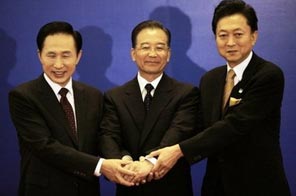China, Japan, SK leaders meet
BEIJING: The leaders of China, Japan and South Korea kicked off a summit in Beijing on Saturday expected to focus on bringing North Korea back to nuclear disarmament talks and building regional trust.
The gathering is the second leg of new Japanese Prime Minister Yukio Hatoyama's debut regional touraimed at forging a good foundation for relations with Tokyo's often distrustful neighbours.
But the vexed subject of North Korea will likely seize the spotlight during the summit hosted by Premier Wen Jiabao, and also attended by South Korean President Lee Myung-Bak.
The three shook hands for the cameras before sitting down for the summit, which follows one held in December in Fukuoka, Japan.
In his opening remarks, broadcast on state television, Wen said the talks were important "to improve political mutual trust, promote mutually beneficial cooperation, and push forward stability and development in Asia.
"We will strive to achieve a practical and positive result out of this meeting, to send the three nations' cooperation to a new level," he said.
North Korea said Monday during a visit by Wen that it was willing to return to six-party denuclearisation talks but only if it first was granted direct negotiations with the United States.
Washington has said it would agree to bilateral talks within the six-party framework, but that the goal must be a complete end to Pyongyang's nuclear weapons drive.
The six-way negotiations are hosted by China, a close ally of North Korea, and also include South Korea, the United States, Russia and Japan.
Japanese Foreign Minister Katsuya Okada told reporters late Friday that he came out of a meeting with his Chinese counterpart Yang Jiechi -- who also made the trip to Pyongyang -- with a positive impression of the North's intentions.
"From the way he talked, I had an impression that China is highly convinced that North Korea will come back to the six-way talks once getting a certain achievement in dialogue with the United States," he said.
South Korea's Yonhap news agency reported on Friday that a key North Korean diplomat was likely to visit the United States later this month, which could provide a rare opportunity for face-to-face talks with US officials.
Lee is to present in Beijing what he describes as a "grand bargain" for North Korea's nuclear disarmament -- massive aid and diplomatic and security guarantees in return for a firm commitment to total denuclearisation.
Hatoyama backed the approach in talks with Lee in Seoul on Friday, saying: "We should not provide economic aid unless the North signals a specific action or willingness comprehensively to (end) nuclear and missile development."
The two leaders called for a "fundamental change" in North Korea's attitude to end the nuclear standoff, and said sanctions should stay in force until then.
Japanese foreign ministry spokesman Kazuo Kodama told reporters late Friday in Beijing that if North Korea acted "positively, Japan will respond positively".
"We are witnessing some signs of moves for resumption of the six-party talks," he said.
The three leaders were also expected to focus on building strong regional ties, with Hatoyama looking to erase the distrust and frequent animosity that marked Tokyo's relations with its neighbours under the Liberal Democrats.
Chinese State Councilor Dai Bingguo said Friday after meeting with Okada that relations between Beijing and Tokyo were off to a "good start" under Hatoyama, state media reported.
The key trading partners are also expected to touch on the global financial crisis, climate change and the environment.
A Japanese foreign ministry official said earlier this week in Tokyo that Hatoyama was also expected to explain his vision for an East Asian community a European Union-style economic and political alliance of Asian nations.






